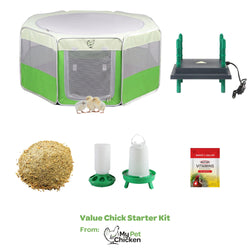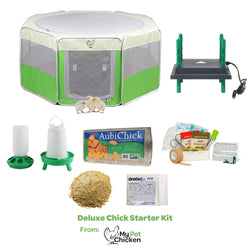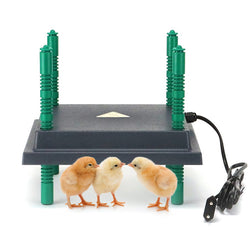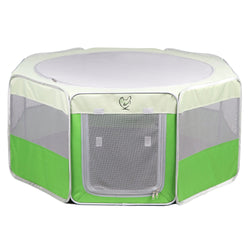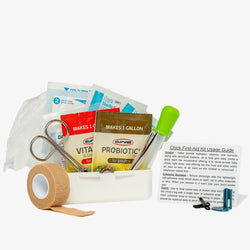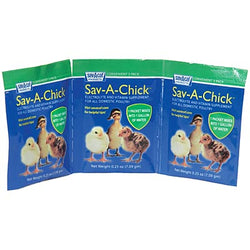How long can eggs be left outside once they've been laid before being refrigerated?
Back to blog
You will want to gather eggs every day, and refrigerate them as soon as they've been gathered. This keeps them freshest. However, in the "good old days," of course, eggs were not refrigerated right away. That's surprising to many people!
After all, milk that is not refrigerated will go bad, and it will do so pretty immediately... but not eggs. In fact, when a hen is laying eggs to hatch, it can take her about two weeks to gather a clutch large enough to incubate. At the end of that time, the first egg is still fresh enough to develop into a chick once mother hen begins incubating. It hasn't gone bad, even though it's been sitting outside in varying temperatures in the nest, definitely not under refrigeration!
Since eggs are designed to grow baby chicks in a healthy environment, eggs only get "rotten" if bacteria has invaded them; they don't rot just from lack of refrigeration, or it would be impossible for hens to hatch chicks. Read in the related questions below about the "bloom" on your eggs that you don't want to wash off, to keep them freshest. Of course, if the eggs are very dirty you will NEED to wash your eggs.

You'll also want to look at your management practices to figure out why they are getting so dirty... is your run muddy? Is there something you can do to keep it drier?
The reason we refrigerate eggs in modern times is that if there has been any bacterial penetration through the bloom and the egg shell--and dirty eggs are more likely to see that--then refrigeration keeps the bacteria from growing quickly and spoiling your egg, so eggs kept under immediate and constant refrigeration are less likely to have serious bacterial problems. Plus, unrefrigerated eggs age more quickly, and will eventually lose their good taste, even if they don't actually become rotten, per se. In sum, it is just sensible to refrigerate your eggs to keep them as fresh and tasty as possible. If you are selling eggs, your state probably has laws outlining proper refrigeration and storage requirements, too, so be sure to check those.
For more information about what happens to eggs as they age, you can read this study regarding the differences between keeping eggs refrigerated vs unrefrigerated from Mother Earth News, plus their very interesting tasting notes and many long term storage methods you may not have ever heard of. As you see at the link above, they also conclude that refrigerating unwashed eggs is best, but it is still interesting to read about the other methods they tested and to see what happened as the eggs aged.
Last, if it is quite cold outside, it's still not a good idea to leave eggs out in the coop/nest for long. For one, having a lot of eggs in the nest means they're more likely to be cracked accidentally, attract predators, or inspire broodiness in your hens. Plus, if it's super cold, they can freeze and crack. Once they're cracked, of course, the shell no longer protects the contents, so you should probably discard them to be safe. What a waste of good eggs!

After all, milk that is not refrigerated will go bad, and it will do so pretty immediately... but not eggs. In fact, when a hen is laying eggs to hatch, it can take her about two weeks to gather a clutch large enough to incubate. At the end of that time, the first egg is still fresh enough to develop into a chick once mother hen begins incubating. It hasn't gone bad, even though it's been sitting outside in varying temperatures in the nest, definitely not under refrigeration!
Since eggs are designed to grow baby chicks in a healthy environment, eggs only get "rotten" if bacteria has invaded them; they don't rot just from lack of refrigeration, or it would be impossible for hens to hatch chicks. Read in the related questions below about the "bloom" on your eggs that you don't want to wash off, to keep them freshest. Of course, if the eggs are very dirty you will NEED to wash your eggs.

You'll also want to look at your management practices to figure out why they are getting so dirty... is your run muddy? Is there something you can do to keep it drier?
The reason we refrigerate eggs in modern times is that if there has been any bacterial penetration through the bloom and the egg shell--and dirty eggs are more likely to see that--then refrigeration keeps the bacteria from growing quickly and spoiling your egg, so eggs kept under immediate and constant refrigeration are less likely to have serious bacterial problems. Plus, unrefrigerated eggs age more quickly, and will eventually lose their good taste, even if they don't actually become rotten, per se. In sum, it is just sensible to refrigerate your eggs to keep them as fresh and tasty as possible. If you are selling eggs, your state probably has laws outlining proper refrigeration and storage requirements, too, so be sure to check those.
For more information about what happens to eggs as they age, you can read this study regarding the differences between keeping eggs refrigerated vs unrefrigerated from Mother Earth News, plus their very interesting tasting notes and many long term storage methods you may not have ever heard of. As you see at the link above, they also conclude that refrigerating unwashed eggs is best, but it is still interesting to read about the other methods they tested and to see what happened as the eggs aged.
Last, if it is quite cold outside, it's still not a good idea to leave eggs out in the coop/nest for long. For one, having a lot of eggs in the nest means they're more likely to be cracked accidentally, attract predators, or inspire broodiness in your hens. Plus, if it's super cold, they can freeze and crack. Once they're cracked, of course, the shell no longer protects the contents, so you should probably discard them to be safe. What a waste of good eggs!


